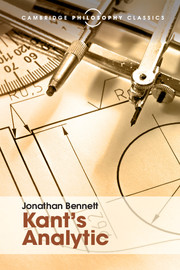Book contents
13 - The first analogy
from Analytic of principles
Published online by Cambridge University Press: 05 July 2016
Summary
The Analogies of Experience: preliminaries
The Analogies of Experience assert that experience must fall under the categories of substance, cause and community. The third Analogy, concerning community, does not require extended discussion. It says: ‘All substances, in so far as they can be perceived to coexist in space, are in thoroughgoing reciprocity.’ Kant is here making the interesting and rather Spinozist claim that we could not know that two things coexisted in the same universe unless they had causal commerce (= community) with one another. His attempt to prove this, however, is a failure which is not even incidentally valuable except for a few flickers of light which it throws on the second Analogy.
The remaining sections of my book will centre on Kant's abominably organised ‘proofs’ of the first and second Analogies. This thirty-page stretch of the Critique, for all its obscurities, ellipses and repetitions, is one of the great passages in modern philosophy.
The so-called principle of the Analogies of Experience says: ‘Experience is possible only through the representation of a necessary connection of perceptions.’ The Analogies do indeed concern necessary connections—between the different qualities of a single substance, between cause and effect, and between things which interact with one another. The principle which covers all these at once, however, is so general as to defeat even Kant's capacity for doing philosophy at the level of the extremely abstract. Although Kant offers ‘proofs’ for all three Analogies, each of which entails the principle, he also tries to prove the principle itself. This ‘proof’ consists mainly in a sketchy restatement of the Transcendental Deduction of the Categories, against the background of a peculiar emphasis upon temporal notions. In one of its versions the principle of the Analogies says: ‘All appearances are, as regards their existence, subject to a priori rules determining their relation to one another in one time’; and Kant also remarks that the Analogies hinge on the fact that the contents of experience must fulfil whatever conditions are necessary for ‘the determination of the existence of objects in time’. This last phrase can be clarified only when we move to the Analogies themselves, but it does indicate that temporal concepts are going to be central.
- Type
- Chapter
- Information
- Kant's Analytic , pp. 193 - 214Publisher: Cambridge University PressPrint publication year: 2016



